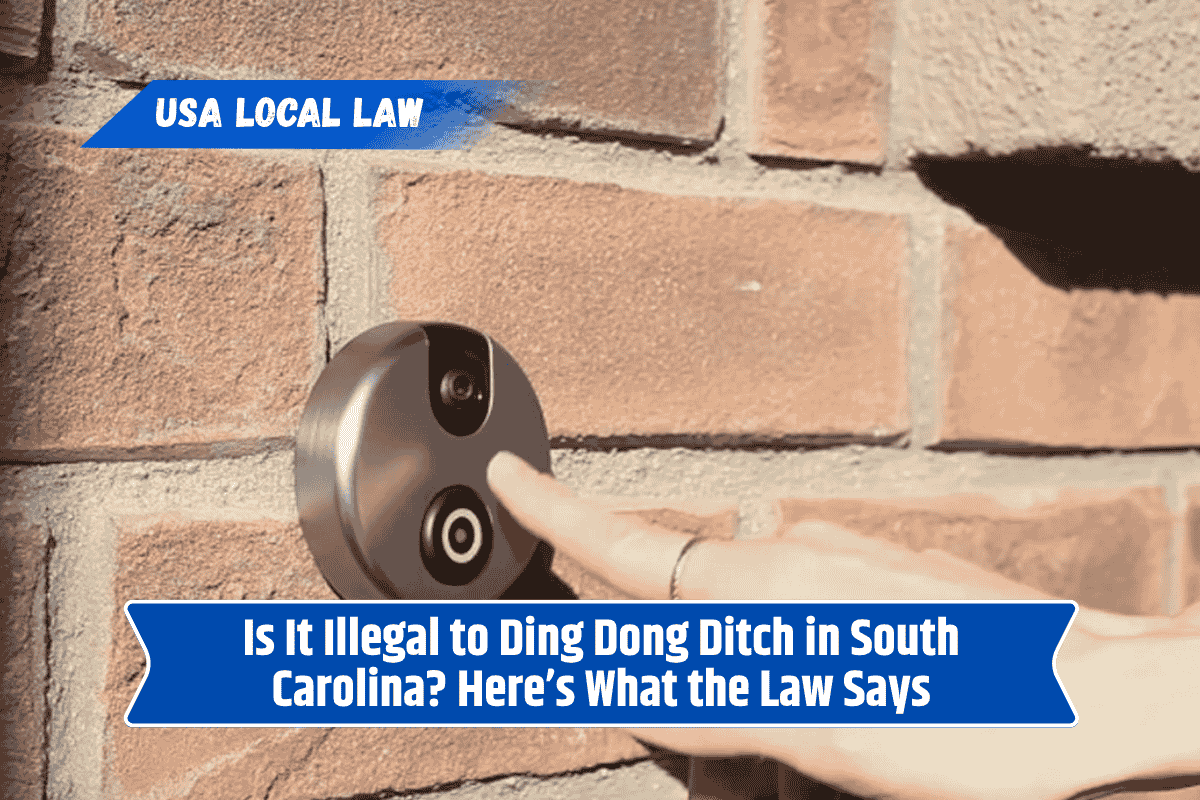Ding dong ditch—ringing someone’s doorbell and running away before they answer—might seem like a harmless prank to some. It’s been a part of childhood mischief for decades.
But in South Carolina, this “harmless fun” could actually have legal consequences, depending on how it’s done and how it’s received. This article explains what South Carolina law says about ding dong ditch and when it might cross the line from a joke into a crime.
Is Ding Dong Ditch Against the Law in South Carolina?
Ding dong ditch itself is not directly named as a crime in South Carolina law. However, depending on the situation, it can still lead to legal trouble under certain laws.
What seems like a joke can easily fall under trespassing, harassment, disturbing the peace, or even disorderly conduct—especially if it’s repeated or causes fear.
When Ding Dong Ditch Becomes Illegal
Ding dong ditch may be considered illegal in South Carolina under these situations:
Trespassing: If you step onto private property, especially when there are signs like “No Trespassing,” you could be charged with criminal trespass.
Disturbing the Peace: Repeated pranks, especially late at night, may fall under disturbing the peace or noise violations.
Harassment or Intimidation: If a homeowner feels threatened or harassed by the prank, especially if it happens multiple times, you could face harassment charges.
Disorderly Conduct: If the prank creates a public disturbance or leads to confrontation, you could be cited for disorderly conduct.
In many of these cases, intent matters. If the prank is seen as harmless fun and the homeowner doesn’t complain, you might not face consequences. But if someone feels disturbed, harassed, or threatened, the situation can quickly become serious.
What South Carolina Law Says
South Carolina Code of Laws doesn’t list “ding dong ditch” specifically, but other laws may apply:
SC Code § 16-11-620 (Trespassing): Entering another person’s property without permission may result in a fine or jail time.
SC Code § 16-17-530 (Disorderly Conduct): Behavior that causes public alarm or annoyance can lead to a misdemeanor charge.
SC Code § 16-3-1700 (Harassment): Repeated actions that cause emotional distress or fear of injury can fall under harassment laws.
If police are called and your actions fall into any of these categories, you could be charged—even if you’re a minor.
Can You Get Arrested for Ding Dong Ditch?
Yes, you can get arrested, especially if the prank turns into repeat harassment, trespassing, or causes a strong reaction from the homeowner. If the person calls the police and you’re caught, the officer may issue a warning, a fine, or even make an arrest, depending on the situation.
Even if you’re not arrested, your actions could lead to a police record, especially if you’re under 18. While minors are often treated with more leniency, repeat offenses can lead to juvenile charges or court-ordered consequences like community service.
What Parents and Teens Should Know
Parents should understand that ding dong ditch is not always “just a prank” under the law. In today’s world, people are more cautious, and unexpected knocks on the door—especially at night—can cause fear or panic.
Some homeowners may think it’s a burglary attempt or a threat, which could lead to dangerous reactions or legal complaints.
Teens should also realize that running across private property and disturbing strangers can carry real consequences, even if they didn’t mean harm.
Ding dong ditch may seem like harmless fun, but in South Carolina, it can quickly turn into a legal issue. While the act itself isn’t specifically outlawed, it can lead to charges like trespassing, harassment, or disorderly conduct.
Whether you’re a teen pulling a prank or a parent of one, it’s important to understand that what seems funny to one person might feel threatening to another. To stay on the safe side, it’s best to avoid pranks that involve disturbing others or entering their property without permission.
